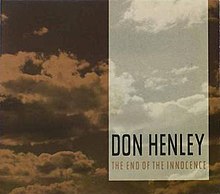The End of the Innocence (song)
| "The End of the Innocence" | ||||||||
|---|---|---|---|---|---|---|---|---|
 |
||||||||
| Single by Don Henley | ||||||||
| from the album The End of the Innocence | ||||||||
| Released | June 1, 1989 | |||||||
| Format | CD | |||||||
| Recorded | 1989 | |||||||
| Genre | Soft rock | |||||||
| Length | 5:16 | |||||||
| Label | Geffen | |||||||
| Writer(s) | Don Henley Bruce Hornsby |
|||||||
| Producer(s) | Don Henley Bruce Hornsby |
|||||||
| Don Henley singles chronology | ||||||||
|
||||||||
|
||||||||
"The End of the Innocence" is the lead single and title track from Don Henley's third solo studio album of the same name, released in 1989. Henley co-wrote and co-produced the song with Bruce Hornsby, who also performed piano; both artists perform the song live in their respective concerts. Henley's version peaked at number eight on the Billboard Hot 100, becoming his fifth solo top ten hit on the chart, more than any of the other members of The Eagles. "The End of the Innocence" also became his fourth number-one single on the Mainstream Rock Tracks chart and peaked at number two on the Hot Adult Contemporary chart. The song features Wayne Shorter on saxophone.
Henley's lyrics take the form of a personal remembrance related to a close friend or companion, and evoke a powerful sense of nostalgia for the lost innocence of childhood and an earlier time. The music was written by Bruce Hornsby years before. Don was driving back from Bruce's ranch in Moorpark when he found out that a friend had been indicted for securities fraud at the time the government was going after Michael Milken, thus the references to having to call the lawyers because daddy had to lie. The references to the "place where we can go" refer to his 50-acre ranch outside of Aspen, CO. off Woody Creek Rd. The reflections and the emotional responses that result represent the end of the innocence of the baby boomer generation, which for some was coupled with a perception of nihilism, consumerism and militarism during the then-current Reagan administration. Even as they yearn for the simplicity and values of the past, and the uncorrupted people they used to be, the song sees these characters and this generation coming to terms with the responsibilities and challenges facing Americans entering middle-age in the 1980s.
The black and white music video for the song was directed by future film director David Fincher (Seven, Fight Club) and earned Henley an MTV Video Music Award for Best Male Video in 1990.
...
Wikipedia
